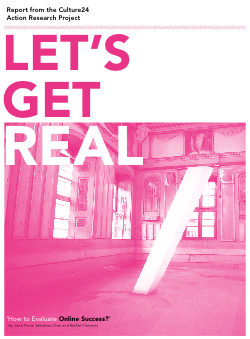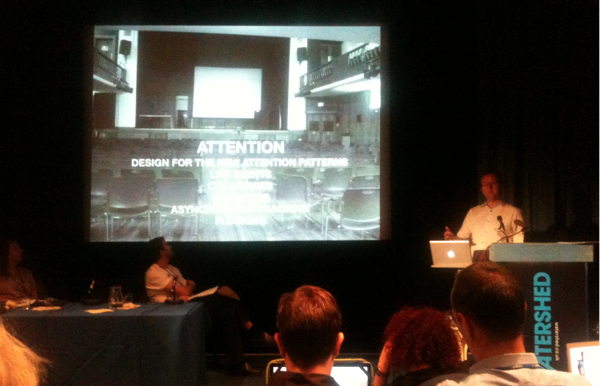
Culture24 have published the findings of an Action Research Project, with the final report titled ‘Let’s Get Real: How to evaluate online success‘ (PDF download). It’s good, and well worth a read.
Having instigated the project, they coordinated efforts between 17 cultural organisations, with the aim being:
to help the sector to improve the way that online cultural activities are evaluated so that we can better understand online user behaviour and hence improve the quality and reach of all of the sector’s online services
If you read nothing else…
The report makes two top-line recommendations:
- Be clear ‘what’ you are trying to do online and ‘who’ it is for
- Focus your online investment
Expanding on the latter, they say:
if we wish to develop our audiences we need to change the focus of our investment in our online platforms; invest in SEO (Search Engine Optimisation) first, then mobile versions of websites and then social media.
The key recommendations
The report makes ten key recommendations:
- Adopt Google Analytics for basic reporting to government along with central government use of an ISP level alternative (such as Hitwise) for balance. Widespread adoption will allow for in-depth sector analysis and benchmarking.
- Adopt this report’s guidelines on best practice for configuring Google Analytics software to ensure consistent reporting. This should cover basic health checks, user segments and goal definition.
- Revise the ‘whole’ suite of metrics you care about and also the tools you use to measure them. Google Analytics and Hitwise are not the solution; they must be used as part of a multi-tool solution that will require good problem definition before we start.
- Engage with and consider ways to enhance Search Engine Optimisation (SEO) through investment of money and/or time. This is still the main source of most of your traffic.
- Consider where, when and how you use social media to be most effective. Investment can buy you popularity but it can’t buy you engagement.
- Define your online audience targets specifically and map them to your overall business objectives and targets. Online access for everyone is simply not good enough.
- Don’t think about digital activities as something separate from the physical. Build links between your overall mission and business strategy and all your activities. Define your overall strategy before you deploy any specific tactics – digital or otherwise.
- Build links between your web team, your marketing dept, those who create your content and your executive. Work together to define shared goals that can be used for reporting.
- Get ready for mobile. Ensure your website is mobile friendly and you can respond to the growing trend of mobile access. Consider what your users want to on the move?
- Remember to look at the patterns, not just the numbers. Small can be beautiful.
All of which sound perfectly sensible to me. As I said, if you’re interested in this sort of thing then the report is well worth your time.
The Conference
The report was launched at a conference held at Bristol’s Watershed. In the morning, Tom Uglow and Matt Locke (in the pic above) spoke about the general context into which culture fits online. Culture24’s Jane Finnis then gave an overview of the findings of the report and various participants in the project generously shared examples of digital efforts they’d made that had fallen a little flat but had taught them some good lessons.
In the afternoon we had the choice between sitting in on the ‘crit room’ where websites had been submitted for review by Channel 4’s Adam Gee and two UX experts, or flitting between the ‘talk tables’ I went for the latter and spoke with people from Culture24, Building Digital Capacity for the Arts and the people responsible for the social media aspects of the report.
Other bits and pieces
I had a chat with one of the people behind The Ice Book, which is a lovely little thing. They’ve been brought in to work on a stage adaptation of Howl’s Moving Castle, so that’ll be interesting. I also went a bit fanboy when I spotted the man behind this talk. Only a little bit, mind.
Some links
- Culture24 website with download of the Let’s Get Real report (PDF) along with a social media metrics toolkit and a Google Analytics health checklist with instructions for Advanced User Segments
- Let’s Get Real conference information
- Conference hashtag: #C24LGR
- Conference notes from B Hunter
- Conference notes from Hugh Wallace
- Seb Chan’s post about the report
- Katie Smith’s write-up on Storify
- Ylva French’s conference notes: Getting real and failing forward online…
- Kevin Bacon attended and was left asking Are museums going post-digital?
- Oonagh Murphy reviewed the conference for Museums at Night and, on her own blog, she’s written about the keynote talks and the failing forward case studies
- Gavin Mallory from Cogapp has posted notes from the mobile-focussed talk table
- Rhiannon Looseley’s twelve takeaways (with lots of good links)

Cheers for the mention and lovely to meet you. I’ll be keeping an eye out for the stage version of Howl’s Moving Castle you mention… should be amazing
As noted in the report; there’s a real benchmarking issue if some orgs are reporting web stats based on log file analysis whilst others are using Google Analytics.
Google Analytics should almost certainly be accepted as the benchmark. £2,000 per annum for auditing of web analytics is just too much for most arts orgs.
There’s an interesting thing on p5. Central Office of Information require funded museums and arts organisations to report data annually on website usage. However, “COI guidelines require the use of an ABCe 2-star accredited analytics tool for this reporting. However, Google Analytics is not a 2-star accredited product, as Google does not release the supporting data”.
The problem, plain and simple, is the lack of compelling content on most arts/culture related websites. SEO is 99% voodoo and 1% common sense and paying money or wasting time to get it done is another example of what’s wrong with the arts. It might also help if culture folks hired designers and media specialists for content production who knew what the hell they were doing.
@Martin – but then nobody hires the wrong person on purpose. How do you make sure people hire the right specialists? Finding the right people does seem to be a problem for some arts organisations – I’ve met plenty who’ve been bitten once before and are overly wary about doing anything now.
They recommend investing money and/or time, I’m not sure they recommend commissioning your local SEO shark.
This ‘SEO is common sense’ meme is barely half true. Yes content is important, but SEO is a bit more than that. It has to be designed into the structure of your website. SEO = Design.